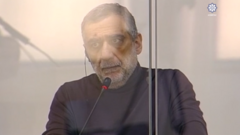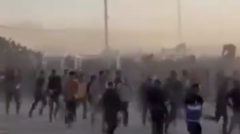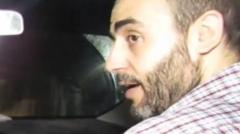Ruben Vardanyan, a wealthy businessman and former leader in Nagorno-Karabakh, is on trial for war crimes, which raises concerns about the implications for peace efforts between Armenia and Azerbaijan.
**Billionaire's High-Stakes Trial in Azerbaijan Amid Fragile Peace Talks**

**Billionaire's High-Stakes Trial in Azerbaijan Amid Fragile Peace Talks**
A billionaire faces serious charges in Azerbaijan, potentially impacting ongoing peace negotiations with Armenia.
In a significant ongoing trial in Azerbaijan, billionaire Ruben Vardanyan, one of Armenia's wealthiest individuals, faces life imprisonment over 42 charges, including war crimes and terrorism. His predicament unfolds against the backdrop of tumultuous peace talks between Azerbaijan and Armenia, aimed at resolving the long-standing Nagorno-Karabakh conflict. While the two nations have reportedly agreed on a preliminary peace deal, Vardanyan and 15 former ethnic Armenian leaders find themselves excluded from these negotiations, currently standing trial in Baku’s military court.
Vardanyan, a 56-year-old entrepreneur known for his extensive investments in Armenia and philanthropy, has become a controversial figure following his relocation to Nagorno-Karabakh in September 2022. This mountainous region, historically populated by ethnic Armenians but politically recognized as part of Azerbaijan, has been the focal point of two devastating wars between the two nations. His recent arrest followed a military operation by Azerbaijan, which resulted in a rapid takeover of Nagorno-Karabakh, forcing over 100,000 ethnic Armenians to flee.
The trial has drawn criticism, with many observers labeling it a "show trial." Accusations of mistreatment while in custody have surfaced, alongside images suggesting possible abuse. Azerbaijan officials, however, deny these allegations, asserting compliance with international law.
Complicating the situation are concerns regarding the broader implications of Vardanyan's trial for the Armenian community, with some viewing it as a pivotal moment in the ongoing conflict. Observers highlight that the unfolding peace agreement does not address the status of political prisoners or the rights of ethnic Armenians, resulting in skepticism toward the Armenian government's handling of the matter.
While Armenian leaders, including MP Arsen Torosyan, advocate for separating the issue of Vardanyan and others from peace negotiations, Vardanyan himself cautions against this approach, warning that it symbolizes a larger struggle for the Armenian identity in the region. He describes his trial as emblematic of a more extensive historical and cultural conflict, urging that the resistance to perceived injustices could reignite tensions between the two nations.
As negotiations evolve, Vardanyan’s legal battles and their consequences remain a focal point. His next court appearance is set for Tuesday, raising anxiety among his supporters that the impending peace deal may overshadow his plight and that of others similarly situated.
Vardanyan, a 56-year-old entrepreneur known for his extensive investments in Armenia and philanthropy, has become a controversial figure following his relocation to Nagorno-Karabakh in September 2022. This mountainous region, historically populated by ethnic Armenians but politically recognized as part of Azerbaijan, has been the focal point of two devastating wars between the two nations. His recent arrest followed a military operation by Azerbaijan, which resulted in a rapid takeover of Nagorno-Karabakh, forcing over 100,000 ethnic Armenians to flee.
The trial has drawn criticism, with many observers labeling it a "show trial." Accusations of mistreatment while in custody have surfaced, alongside images suggesting possible abuse. Azerbaijan officials, however, deny these allegations, asserting compliance with international law.
Complicating the situation are concerns regarding the broader implications of Vardanyan's trial for the Armenian community, with some viewing it as a pivotal moment in the ongoing conflict. Observers highlight that the unfolding peace agreement does not address the status of political prisoners or the rights of ethnic Armenians, resulting in skepticism toward the Armenian government's handling of the matter.
While Armenian leaders, including MP Arsen Torosyan, advocate for separating the issue of Vardanyan and others from peace negotiations, Vardanyan himself cautions against this approach, warning that it symbolizes a larger struggle for the Armenian identity in the region. He describes his trial as emblematic of a more extensive historical and cultural conflict, urging that the resistance to perceived injustices could reignite tensions between the two nations.
As negotiations evolve, Vardanyan’s legal battles and their consequences remain a focal point. His next court appearance is set for Tuesday, raising anxiety among his supporters that the impending peace deal may overshadow his plight and that of others similarly situated.


















